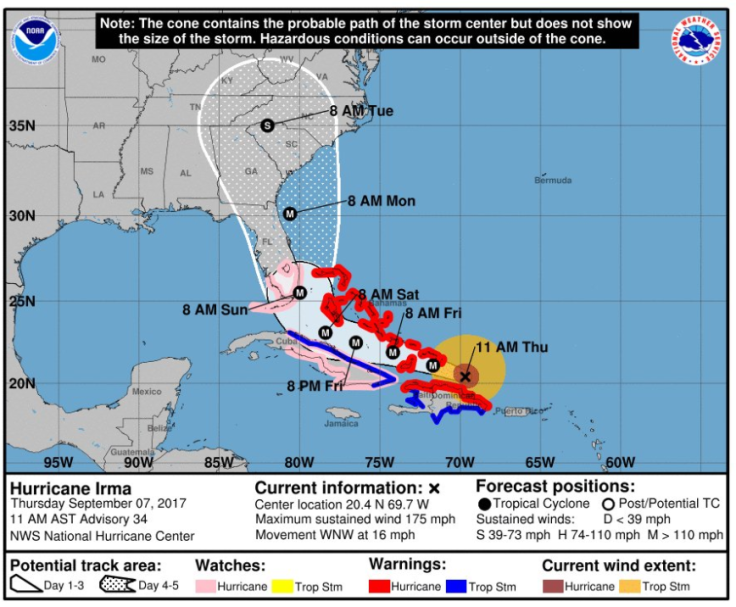Where Is Hurricane Irma Now?

Hurricane Irma was tracking near the Dominican Republic Thursday, making its way toward Turks and Caicos and the Bahamas as a Category 5 storm. Moving west-northwest at about 17 mph, Irma was bringing maximum winds of 185 mph. The hurricane was becoming increasingly likely to make landfall in the United States in the coming days — particularly in South Florida.
The storm brought devastating winds to the Dominican Republic Thursday morning and was making its way toward Haiti in the afternoon. Irma was expected to hit Turks and Caicos late Thursday to Friday before moving on to the Bahamas, the Weather Channel reported. Cuba would likely take a hit Friday or this weekend before the storm moved toward the continental United States.
“The hurricane has the potential to be a major event for the east coast,” said Evan Myers, AccuWeather senior expert meteorologist and chief operating officer. “Because Irma is likely to move up along the east coast of Florida, Georgia and South Carolina, people from the Florida Keys all the way to Cape Hatteras, North Carolina, should prepare to be ready to evacuate coastal areas, starting with south Florida now.”
A hurricane watch has been issued for South Florida and the Florida Keys. More information available at https://t.co/tW4KeGdBFb pic.twitter.com/SzlkILQj0h
— National Hurricane Center (@NHC_Atlantic) September 7, 2017
It remained uncertain exactly where the hurricane would hit the U.S. after moving on from the Caribbean — but the storm was expected to bring damaging winds and rain to South Florida by Saturday afternoon. Meteorologists warned the storm could also make landfall in North and South Carolina.
“If the center of Irma does pass near Miami and continues northward over eastern Florida, the impacts will be severe,” said AccuWeather senior meteorologist Mike Doll.
President Donald Trump declared a state of emergency in Florida, Puerto Rico and the U.S. Virgin Islands. Florida Gov. Rick Scott suspended tolls across the state so residents could evacuate quickly and efficiently. An estimated 25,000 people had already left the Florida Keys in recent days, while Miami Dade and Broward counties issued mandatory evacuation orders beginning Thursday.
“Take this seriously,” Scott said. “Leave now. Don’t wait. It’s wider than our entire state and could cause major and life threatening impacts on both coasts.”
Don't focus on the exact track of #Irma. There is a high probability of trop storm and hurricane conditions well away from the center. pic.twitter.com/U1rwqtANCP
— National Hurricane Center (@NHC_Atlantic) September 7, 2017
© Copyright IBTimes 2025. All rights reserved.






















